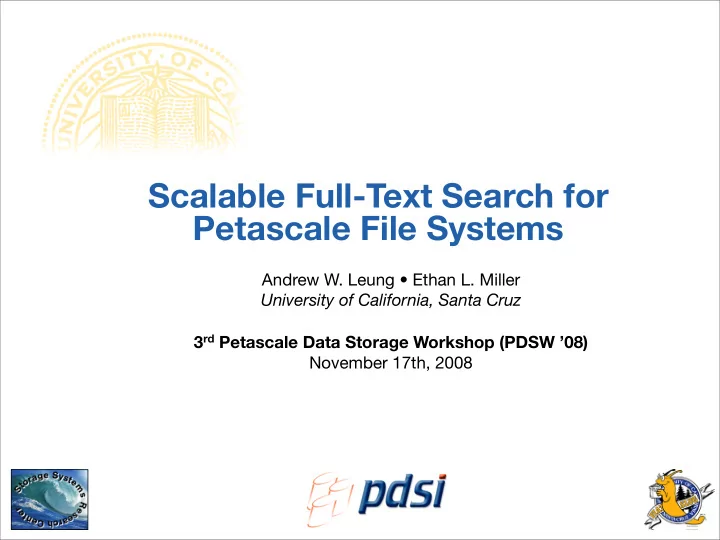

Scalable Full-Text Search for Petascale File Systems Andrew W. Leung • Ethan L. Miller University of California, Santa Cruz 3 rd Petascale Data Storage Workshop (PDSW ’08) November 17th, 2008
Need scalable file management • Today’s file systems contain • Petabytes of data, billions of files, and thousands of users • File systems have focused on scaling • I/O and metadata throughput, latency, fault-tolerance, cost • Limited work on scaling organization and retrieval • File system organization largely unchanged for 30 years • File organization and retrieval has not kept pace with file systems 2
Problems with current approach • Files are organized into a single hierarchy • Possibly billions of files and directories • Slow and inaccurate • Users must carefully organize and name files and directories - Tedious and time consuming • Users must manually navigate huge hierarchies - Wastes time and is inaccurate • Files only have a single classification • Does not scale to petascale file systems 3
Scalable file retrieval with search • File system search has been researched for decades • Focused on full-text (aka keyword) search • Organizing and retrieving files with search • Files have many automatic classifications - Organization becomes much simpler • Files can be retrieved with any feature/keywords - No more slow namespace navigation - Reduces the chances of lost data 4
Petascale search challenges • Cost • Very expensive - often requires dedicated hardware • Performance • Tough to scale - often trade-off search and update performance • File system search should efficiently do both • Ranking • Limited file ranking algorithms • Security • Can significantly degrade search performance 5
A specialized petascale search design • Exploits file system properties • Can be integrated within the file system • Leverage namespace locality with hierarchical partitioning [Leung09] • Namespace influences • File access patterns [Leung08, Vogel99] • File properties [Agrawal07, Leung09] • Who accesses them [Agrawal07, Leung08] 6
Index partitioning / home usr proj john jim distmeta reliability include thesis scidac src experiments Keyword 1's Posting List Segments Hard Disk • Traditional file system search uses an inverted index • Consists of a dictionary that points posting lists • Our approach partitions the index based on the namespace • Posting lists are broken into segments 7
Benefits of our design • Flexible, fine-grained index control • Search and update can be controlled at sub-tree granularity • Critical for index with billions of files • Reducing the search space • Eliminate partitions that do not match search criteria • Allows users to control scope and performance of queries • Efficient index updates • Smaller posting lists are easier to update and keep sequential on-disk • Better resource utilization 8
The indirect index Indirect Index Keyword 1 Keyword 2 Keyword 3 Keyword 4 Dictionary Posting Lists ... Posting List Segments for Partition 1 ... Posting List Segments for Partition 2 • An inverted index that points to partition locations • Stores the dictionary • Posting lists store partition segment locations 9
Other possible extensions • Security • Eliminate restricted sub-trees from search space • No extra space required and reduces permission check • Ranking • Utilize namespace locality to improve search result ranking • Employ different ranking algorithms for different sub-trees • Cost efficiency • Exploit Zipf-like sub-tree query patterns • Compress or migrate rarely searched sub-tree segments to lower-tier 10
Current and future work • We are currently working on... • Collecting and analyzing keyword data sets • Crawl real-world large-scale file systems • No current file system search keyword collections exist • Completing the index and algorithm designs • Implementation and evaluation within the Ceph petascale file system • Allows realistic integration and benchmarking 11
Thank you! • Thanks to: • Minglong Shao, Timothy Bission, Shankar Pasupathy and NetApp’s ATG • SSRC faculty and students • Come see us at the poster session! • Spyglass: Fast, Scalable Metadata Search for Large-Scale Storage Systems • Questions? 12
Recommend
More recommend